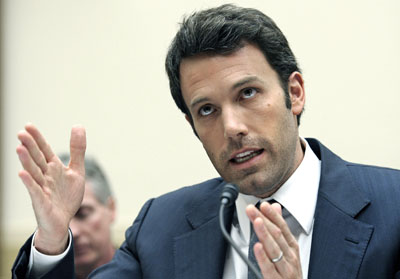
Aptly falling on the 100th anniversary of International Women’s Day, a House subcommittee called a hearing yesterday on what can be done to “secure peace in the midst of tragedy” in Congo.
Members of the Subcommittee on Africa, Global Health, and Human Rights, chaired by Rep. Chris Smith of New Jersey, heard from an impressive panel of experts, including Donald Yamamoto of the U.S. State Department, Rajakumari Jandhyala from USAID, actor Ben Affleck, Francisca Vigaud-Walsh of Catholic Relief Services, and the Enough Project’s John Prendergast. Themes of the discussion included the upcoming election, civilian protection, women’s rights, and the need for transparency in Congo’s minerals trade.
Following testimony from U.S. government witnesses, actor and humanitarian activist Ben Affleck, the founder of the Eastern Congo Initiative, lent his spotlight to the cause when he opened the second panel with an impassioned plea for the protection of the civilians in Congo, emphasizing the need for the U.S. to demonstrate its commitment to helping end the conflict in eastern Congo by appointing a special envoy for the Great Lakes region.
Five million people have died since 1998 because of the conflict in eastern Congo. We must learn from history and do our part to see that this never happens again. (…) In this time of heightened concern over federal spending, some suggest that austerity demands we turn a blind eye to the crisis in Congo—I believe nothing could be more misguided. It would simply be penny-wise and pound-foolish to allow the Congo to again fall into a state of crisis.
Francisca Vigaud-Walsh, the sexual and gender-based violence advisor at Catholic Relief Services, followed Affleck with insights about the plight of women in Congo. She urged the United States to use its leverage to push for consequences for perpetrators of gender-based violence and for the inclusion of women in Congo’s political structure with elections around the corner.
As the final witness, John Prendergast echoed Affleck’s recommendation for a special envoy and pressed Congress to stay firm in its efforts to tackle Congo’s conflict mineral trade. He insisted that the first step to ending the violence and instability in the area is cutting off the access of armed groups to the profits of conflict minerals. Prendergast quoted Congolese activist Justine Masika, who emphasized the connection between the epidemic of rape in eastern Congo and the struggle for control of mineral wealth:
The link between conflict minerals and mass rape here in Congo is crystal clear so the first and foremost priority for ending the war here in Congo is too set up a system to regulate the minerals trade and the upcoming election is the critical window to push the government of Congo on this issue since it will try harder to please the population before the vote.
“This is an unparalleled moment of opportunity,” Prendergast added.
The subcommittee concluded the hearing by endorsing the strong recommendations of the panelists for the Obama administration to appoint of a Great Lakes special envoy and work to quickly and firmly implement the conflict minerals provision of the Frank-Dodd Act.
CSPAN has the full transcript and video of the hearing.

